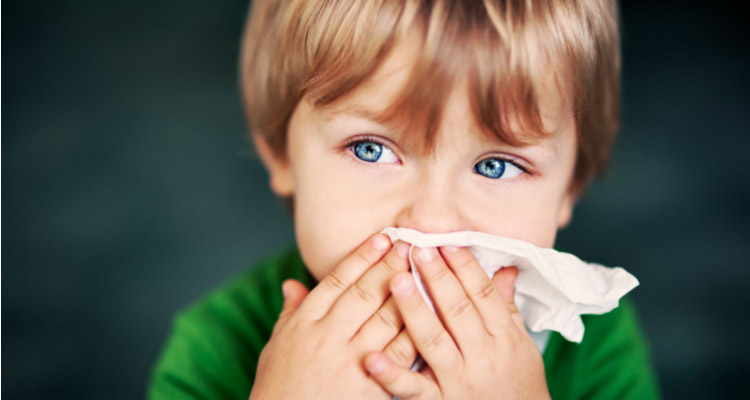Advice
How To Cope With Back to School Bugs


Expert / 2 September, 2024 / Dr Ellie Cannon
Dr. Ellie Cannon shares her advice on coping with back to school bugs. You can Follow Dr. Ellie Cannon on Insta, @drelliecannon.
September for most parents means back to school. For me, with my GP hat on, it means back to viruses! Glamorous it ain’t. When your little ones go back to school, my clinic fills up with coughs, colds and tummy bugs as they lovingly share their germs with each other.
I have one friend who won’t be reading this blog because she has banned me from using the word virus with her. She said after three kids she is fed up hearing that word. Every time she goes to the doctor with some cough/sore throat/snot extravaganza that is what she is told: It’s just a virus. He’ll be better in a few days, just keep him at home. Why can’t these things have names: it’s always just a virus, isn’t that a cop-out?
Back to school bugs
It’s not actually a cop-out. Most of the minor illnesses our children get are thankfully, just viruses and that is great. To be honest, when you go to the doctor you do want to be told it’s just a virus.
Viruses are the simple infections your child, and you, will get that resolve easily and need no antibiotics. Of course, there are some serious viruses, but in the context of snot-fests and back-to-school coughs, a virus is what you want. Sure, there’s no specific treatment, but they get better easily and are generally not serious. Viruses do not need antibiotics which is fantastic to be able to avoid yucky medicine and possible side effects. It should be reassuring when you’re told it’s just a simple, boring virus with no name. You don’t want anything with a more interesting name than that.
YOU MIGHT ALSO LIKE
Your Very Handy Back To School Kit List
Mummy Hacks: Where To Shop The Best School Uniform + Advice On What To Buy
How to treat my child’s virus?
The trouble is, in today’s world of now, now, now, I notice not many people have the patience to wait for viruses to get better. You can’t rush a virus – your average cough or cold can take a child a good week to get over. That’s a week off school, a week of cancelled play-dates and a week of miserable mummy. But that’s how it is with back to school bugs, no over-the-counter medicine nor antibiotics is going to speed that up.
So what can you do? Well, it’s all pretty simple.
Keep them hydrated
No matter what virus your child has, drinking is the most crucial thing. Having a fever, vomiting or having diarrhoea uses up water and that all needs to be replaced. Whatever drink he wants, let him have. Now is not the time to be fussing over the rules of what kids should drink. Yes, yes, of course, we all avoid sugary pop if we can, but quite frankly when they need to drink, it can really be anything. The water of course is the best drink, but sometimes a bit of sugar or a “treat” of something fizzy can encourage them to drink when they otherwise don’t feel like it. At this stage getting the fluid in is critical. Employ all known bribery tactics to encourage fluids: curly straws, fun ice cubes, favoured drinking bottles, etc, etc.
Make sure they sleep
Kids are much more tired when they are ill: think of yourself when you have flu. You need to sleep more during the day, and the night and still will have no energy even to turn the telly on. That is how we humans recover from things. We need to sleep. Do not be tempted to send them back to school too quickly or take them to their ballet class (she was really desperate to go) because being ill is exhausting and vegging out is essential.
Being drowsy is a cause for alarm
It is very normal for kids to take an unexpected nap or sleep a longer night’s sleep when they are under the weather. That is fine: the more they sleep, the sooner and easier they’ll recover. We expect kids to sleep more when they are ill, even with a minor cold. There is an essential difference between being tired which is fine for a poorly child and being drowsy which is not fine. Being drowsy is different from being tired. Drowsiness is when you can’t wake them easily, or your child seems constantly asleep, or much less alert. Drowsiness is not normal, and is always a reason to see the doctor urgently.
It’s normal for them not to want to eat
Feeding our children is a very primal urge for a mother which is why a lot of you come and tell me he’s not eating when they’re poorly. Do not fear! No matter how unwell a child is, even with the most minor of colds, they don’t eat food. Even the best eaters lose their appetite and they seem to go on for days and days not eating. This shouldn’t alarm you or concern you. It is a sign something is amiss but it is no more sinister than that. It is certainly not a sign they are desperately unwell, as it happens even with the mildest of colds.
Not eating worries us mummies a lot, but it shouldn’t. In the context of a cough or a cold or a tummy upset it is par for the course. And more often than not, their appetite will recover a few days after they have. That too is normal – it seems to take time for it to catch up. Just be patient. Still offer food as normal, perhaps just favourites. If they eat toast or cereal every day for a few days it doesn’t really matter while they’re unwell. Be guided by what they seem to want, and never force it. It’s the drinking that counts. Not the food.
Keep calm. Most children recover from viruses really quickly. Look at it as a week off the hectic routine and school social life.
Dr. Ellie Cannon author of ‘Keep Calm; the New Mum’s Manual’ (Vermilion) available at Amazon.com. Follow Dr. Ellie Cannon on Instagram.
READ NEXT
How To Talk To Your Child About Starting School: Top Tips From A Headmistress
How To Adjust To The Back To School Sleep Routine
-

 Destination9 months ago
Destination9 months agoSingapore Airlines CEO set to join board of Air India, BA News, BA
-

 Breaking News10 months ago
Breaking News10 months agoCroatia to reintroduce compulsory military draft as regional tensions soar
-

 Gadgets4 months ago
Gadgets4 months agoSupernatural Season 16 Revival News, Cast, Plot and Release Date
-

 Tech News1 year ago
Tech News1 year agoBangladeshi police agents accused of selling citizens’ personal information on Telegram
-

 Productivity12 months ago
Productivity12 months agoHow Your Contact Center Can Become A Customer Engagement Center
-

 Gadgets1 month ago
Gadgets1 month agoFallout Season 2 Potential Release Date, Cast, Plot and News
-

 Breaking News10 months ago
Breaking News10 months agoBangladesh crisis: Refaat Ahmed sworn in as Bangladesh’s new chief justice
-

 Toys1 year ago
Toys1 year ago15 of the Best Trike & Tricycles Mums Recommend






















